~ Bay Weekly Interview ~ with Sandra Martin
Congressman Steny Hoyer
On Fatherhood First — Policy Second
On a rare sunny day in the spring of 2003, the United States Capitol is abloom with tourists. Future Farmers of America — so proclaim their heavy jackets, just right for the previous day’s cool weather — are here from Nebraska. From Arizona, Zuni Indians are here for the Senate’s consideration of their water agreement.
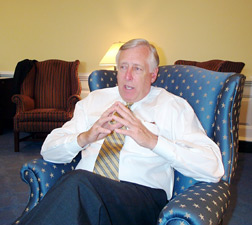 It’s a different world up on the third floor of the stately, sprawling and well-fortified capitol, where a big suite of offices rewards the party loyalty of Steny Hoyer, of Mechanicsville in St. Mary’s County.
It’s a different world up on the third floor of the stately, sprawling and well-fortified capitol, where a big suite of offices rewards the party loyalty of Steny Hoyer, of Mechanicsville in St. Mary’s County.
The padded carpet seems to feel good to the 11-year-old bones of Hoyer’s English spaniel Charlotte, who comes to work with him. Charlotte is the only member of his family still at home. But since the death of his wife, Judith, Hoyer has expanded his career, becoming as active a father and grandfather as he is politician.
The 22-year congressman from Maryland’s 5th District represents the 600,000 citizens of Calvert, Charles and St. Mary’s counties, plus Anne Arundel up to the South River and a big hunk of eastern Prince George’s.
But to move to the third floor of the U.S. Capitol, Hoyer had to succeed in his 11-year quest to be his party leader. As Democratic — and nowadays minority — House whip, Hoyer’s job is just as it sounds: whipping his Democratic colleagues into line on party issues. To line up Democrats, Hoyer does not use a real whip, though when a member is way out of line disapproval must feel sharp as a lash. But there are real carrots, among them prime parking spaces, offices and steps on the leadership ladder.
It’s a ladder Hoyer knows well, having climbed it himself since 1966. Then, fresh out of the University of Maryland and Georgetown University Law School, the boy from Suitland — whose father had emigrated from Denmark in 1934, only nine years before Hoyer was born — got himself elected to the Maryland Senate.
 |
photo courtesy of Steny Hoyer
Judith Hoyer, who died in 1997, was selected a woman of achievement in Maryland history. |
He’s been in public office ever since, except from 1979 to 1981, when he failed in his bid for lieutenant governor on Blair Lee’s ticket. He stepped up to Congress in 1981, when he won a special election. There, he’s been a man of his party as well as a provider for his constituents, first in Prince George’s County and now in five Southern Maryland counties.
As influential in her own way was Hoyer’s wife and high school sweetheart Judith, an early childhood educator in Prince George’s County and one of the 365 Women of Achievement in Maryland History [Bay Weekly Vol. XI, No. 19]. Judith Hoyer died of stomach cancer on February 6, 1997.
All of which brings us on this sunny day to the minority whip’s suite on the third floor of the U.S. Capitol, where we are vetted by Charlotte and visit with her master until the bells in his office call a noon vote on the House floor …
BW We’ve been wanting to interview you a long time. We chose Father’s Day because, since the death of your wife in 1997, you’ve had to do all the parenting of your three grown daughters and grandchildren — how many is it now?
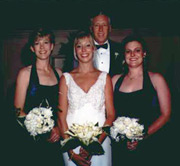 |
photo courtesy of Steny Hoyer
Hoyer and his daughters Susan Taylor, Anne Eckholm and Stefany Hemmer. |
SH My three daughters are Susan, 39; Stefany, 34; and Anne, who will be 32 on June 28. I have five grandchildren: three naturals — Judy, 16; Alexa, one; and J.C. for James Cleveland, six — and two by marriage. Steven, Anne’s husband, has two children — Matthew, 14, and Lauren, eight — by a previous marriage.
BW Back in 2001, you told The Washington Post that “Judy made an observation that has come true. She said, ‘When I’m gone, you’re going to become closer to the girls.’ I was always close to my daughters … but we’re a much closer-knit group I think today than I felt, and I think than they felt, so that’s good, probably.”
You must have been starting off in politics when your girls were born. Tell us about fatherhood then and now …
SH Susan was born in 1964. She was the only one born before I was elected to office. I was in the state senate by the time Stefany was born. So for their entire lives, I’ve been in politics.
What Judy meant by that was that their dad was their friend and their buddy and maybe their bank, but not necessarily their confessor. I was always pretty close to my daughters, but they were also great friends of their mom’s. Their mom was their advisor and counselor and confidant — and confessor.
Judy’s point was when she was gone, there would be a feeling by the daughters and by me of greater communication, and that has come to pass. We’re very close. Matter of fact, this weekend I’m going to go out and be with Susan and her husband — who is CEO of the University of Illinois Alumni Association — in Illinois, Champaign and Chicago. I’ll be playing golf with them. Then in Chicago, we’re all going to a ball game.
BW What are some of the ways you’ve grown closer? Are you now their confidant?
SH We talk to one another more, but confidant? I don’t think that anybody can replace a mom. Anne talks to my sister-in-law, her aunt, probably about some things she wouldn’t talk to me about. It’s a little different talking to dad.
I think we feel very close, and we talk about a lot of things. Luckily they’re all doing very well. They’re terrific young women, successful in their own lives.
BW So you continue to have an active role in your daughters’ lives, despite the demands of Congress, both your district and your role in leadership?
SH I am very busy, and they’re very busy. But we’re very close. I had dinner with my granddaughter Alexa, my daughter Anne and her husband Steve Eckholm Sunday night up at their home in Arnold.
I talked to Stefany, who lives in Queen Ann in Talbot County, two days ago.
BW So none of your daughters lives in your district …
SH None.
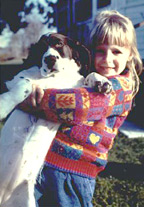 |
photo courtesy of Steny Hoyer
Granddaughter Judy Hoyer, now 16 and named after her grandmother, hugs Hoyer’s English spaniel Charlotte. |
BW And your grandchildren: What sort of relationship do you have with them?
SH If you ask my daughters, they’d say dad is real close to us and really loves us, but they’d say Judy is really his girl. Judy, the 16 year old, is Stefany’s daughter, and Stefany had her very young. She and her father and Stefany lived with us the first six years of her life. When she was born she came home to our house. So we became uniquely close to Judy, who of course is named after my wife.
BW Has the number of women in your family — even your dog — increased your sensitivity to women and all their ways and issues?
SH I think it has. I hope I’m sensitive in any event, but certainly as a father who has three daughters I’m particularly sensitive to their future, to how they’re perceived, how they’re treated, the opportunities available to them, the challenges they see.
BW And how does that play out in policy?
SH When I was president of the Maryland Senate, I was sponsor of the sexual offense reforms 1975-’77. Historically, rape statutes were related in seriousness not to a woman’s physical injury but more to the fact that her virginity or chastity had been damaged. That was mainly because women were treated not so much as persons but as possessions historically.
Even today, I think spousal abuse is an issue that our society has not dealt with as well as it should have.
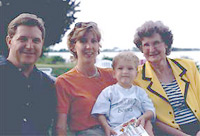 |
photo courtesy of Steny Hoyer
Daughter Susan Taylor, second from left, with husband Loren, son J. C. and grandmother Jill Pickett, Judith Hoyer’s mother. |
BW And in Washington …
SH We’ve had some legislation here in terms of family medical leave. I was brought up by a single mom for a period of time, and she had special challenges. I’ve certainly been through that experience. Hopefully, it’s made me more sensitive. Certainly, it’s made me more aware.
Minimum wage affects working women, and that includes many single moms. This child-care tax credit — which Republicans just dropped out of the tax bill — affects 6.5 million children and 12.5 million families.
BW Congressman, how would you answer our readers who ask, ‘What does Washington do for us? What does politics do for us.’
SH I started in state government, which has a direct impact on people’s lives. Federal government is not perceived as direct as county government, but it has a real impact. It has a real impact in terms of policies and fairness of its taxes. It has an impact on our children and young people in the long term in terms of their ability to get jobs and be successful because of our fiscal responsibility.
I think it has an impact in terms of what we want to invest in. Education is critical. Young people are going to have opportunities because they get an education. That is mainly a state and local responsibility, but the federal government plays a supportive role. In higher education, the federal government plays a very significant role.
And as I said, on minimum wage, the family leave act, child-career assistance: On all of those issues, the federal government plays a role.
BW Let’s take that home to Southern Maryland.
SH In terms of Southern Maryland, I like to think — and I hope many people think — I’ve played a very positive role in the growth of Patuxent River Naval Air Station, the viability of Indian Head Surface Warfare Center [in Charles County, with a focus on specialized ordnance devices and components] and the success of Goddard Space Flight Center, all of which create jobs and economic activity in Southern Maryland and have made it one of the most vibrant regions of our state.
BW To be more specific, let’s look at a little creek down in Deale. How does somebody with as much on his mind as you have time to pay attention to whether a second jetty should be put in Rockhold Creek?
SH First of all, hopefully whatever I do, I will never forget that the only reason I’m in this office is that the majority of the people I represent sent me here to represent them. So my first responsibility is to them, not the Democratic Caucus, not to national issues — except as I represent the opinions, as best I can, of our district.
When [the late House Speaker [Thomas P.] ‘Tip’ O’Neill said all politics is local, not only did he mean that members were driven by that but that members who forgot about the fact that they represented a district, they weren’t here very long.
That’s why I pay attention to Rockhold Creek or Pax River or the Potomac and Patuxent rivers or to the spill at Chalk Point or Goddard Space Flight Center, Metro, University of Maryland or federal employees. Those are all compelling interests to me.
BW So what’s up with that jetty?
SH Obviously recreation and water and the commercial aspects of water are critically important to the 5th congressional district. We’re a water district, surrounded by water. Ensuring both commercial and recreational boating access to marinas, which creates jobs and economic health, is an important aspect.
I think since almost the first day I was elected to represent Southern Anne Arundel County, I’ve been aware of the issue of Rockhold Creek and its repeated silting in as a problem. A number of businesses built up around it as well as boaters came to me. I went to the committee and I went to the Army Corps of Engineers [which is responsible for keeping the creek navigable]. As you know, it’s been dredged a number of times. Not too long ago, the Corps raised the issue. ‘Look, the smart thing for us to do is not to have to appropriate money every two or four or five years to redredge. The smart thing is to try to see if we can stop if from filling in.’
That’s how the jetty came to be. Now it’s become somewhat controversial. We’ll have to see how that develops, but clearly we have to make a decision to ensure that very active businesses, boaters and fishermen, as well as residents, have access to the marinas and to using the channel — at the same time not damaging the environment or the aesthetics.
Editor’s note: The Corps has now extended the public comment period on the jetty to June 30.
BW As well as in the Maryland Senate and in Congress, you’ve spent your career in the Democratic party. Democrats are out of power now in Maryland and in Washington. Are there one or two things you would recommend for your party to get back in power?
SH First of all, I think the soul of the Democratic party is committed to working people. People who go to work every day, pay their bills and play by the rules and sometimes don’t get a fair shake. They’re not getting a fair shake by the fiscal and tax policies that are being pursued by this administration and this Congress.
The wealthy are getting a fair shake. Frankly, some of the poorest are getting a better shake than the middle income Americans that are making the country go.
There are differences in the Democratic party. But I believe there is a tie that binds all of us together. The issues we favor impact working people, their opportunity, their jobs, their environment, their education, their ability to have good health.
So do we differ on ways and means to serve working people? Sure we do from time to time. But I think the soul of our party is committed to making sure that average working Americans are treated fairly and continue to have hope and opportunity for their future.
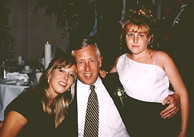 |
photo courtesy of Steny Hoyer
Hoyer celebrates with daughter Anne Eckholm and granddaughter Judy Hemmer. |
BW The bell is ringing to call you to vote, but let’s return to fatherhood for one final question: Your fatherly advice to young parents …
SH You know the song, “The Cat’s in the Cradle”? I tear up when I hear that. The advice I would give to young parents is to take time to be with your children. To get like me — a lawyer, a doctor or a politician — when you’re young, your 20s and 30s, you’re thinking of yourself: your career and your future and your success and the competition.
I think what “The Cat’s in the Cradle” is all about is that you only have so much time. Your kids have a lot of time, and you ought to spend as much time as you can with them.
I didn’t do that. I’m much more sensitive now, now that I’ve realized the preciousness of time.
I find that older parents who have children in their mid-30s or 40s have a much greater appreciation of time. It’s not infinite, what we have.
BW Your grandchildren: Are they a second chance in that sense?
SH My children are a second chance.
It wasn’t that I ignored my children. But if you asked them, they’d say dad wasn’t around very much. I know there was an awful lot of time when I wasn’t there. If I’d have been 20 years older …

 It’s a different world up on the third floor of the stately, sprawling and well-fortified capitol, where a big suite of offices rewards the party loyalty of Steny Hoyer, of Mechanicsville in St. Mary’s County.
It’s a different world up on the third floor of the stately, sprawling and well-fortified capitol, where a big suite of offices rewards the party loyalty of Steny Hoyer, of Mechanicsville in St. Mary’s County.



